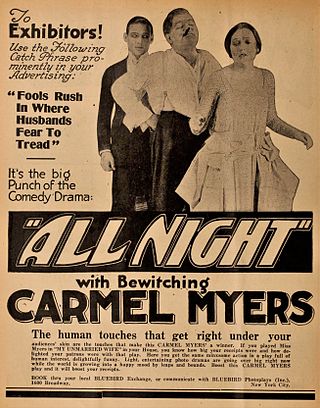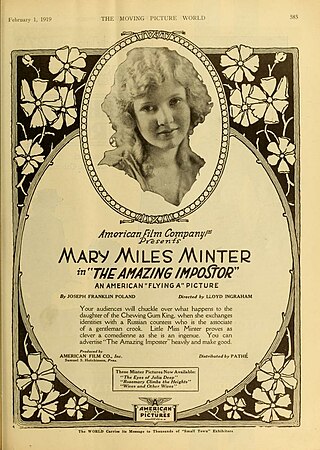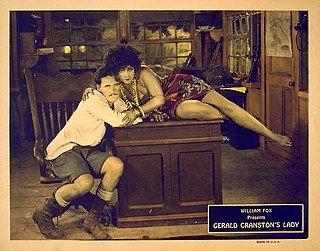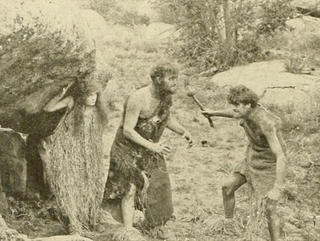
The Moonstone: A Romance by Wilkie Collins is an 1868 British epistolary novel. It is an early example of the modern detective novel, and established many of the ground rules of the modern genre. Its publication was started on 4 January 1868 and was completed on 8 August 1868. The story was serialised in Charles Dickens's magazine All the Year Round. Collins adapted The Moonstone for the stage in 1877.

All Night is a 1918 American silent comedy-drama film directed by Paul Powell and starring Carmel Myers and Rudolph Valentino. It was released by Universal Pictures under the name Bluebird Photoplays.
In the Twilight is a 1915 American silent short drama film directed by Tom Ricketts. The film stars Perry Banks, Charlotte Burton, Reaves Eason, David Lythgoe, Louise Lester, Vivian Rich, and Harry Van Meter.
The Barren Gain is a 1915 American silent short drama film directed by Henry Otto and B. Reeves Eason.

The Lottery Man is a 1916 American silent comedy film written by Theodore Wharton and Rida Johnson Young. It was directed by Leopold Wharton and Wharton, and stars Oliver Hardy, Thurlow Bergen and Lottie Alter. It was produced at the Whartons Studio in Ithaca, New York, and distributed by Whartons Studio. The film was released on June 26, 1916. A print of the film exists in the film archive of the Library of Congress.
A Fight for Love was a 1919 American Western film directed by John Ford and featuring Harry Carey. The film is considered to be lost.

The Road to Mandalay is a 1926 American silent drama film directed by Tod Browning and starring Lon Chaney, Owen Moore, and Lois Moran. It was written by Elliott Clawson, based on a story idea by Tod Browning and Herman Mankiewicz. The script's original shooting title was Singapore. The film took 28 days to complete at a cost of $209,000. The worldwide box office gross was $724,000. Some stills exist showing Chaney's makeup as Singapore Joe.

Beauty and the Rogue is a 1918 American silent comedy crime drama film directed by Henry King and starring Mary Miles Minter. It was filmed under the working title of "Mademoiselle Tiptoe," based on a story by Arthur Berthelet and adapted for the screen by Elizabeth Mahoney, who was the screenwriter for many of Minter's Mutual Film features. As with many of Minter's features, it is thought to be a lost film.

The Moonstone is a 1934 American mystery film directed by Reginald Barker and starring David Manners, Phyllis Barry, Gustav von Seyffertitz and Jameson Thomas. It is an adaptation of the 1868 novel The Moonstone by Wilkie Collins. The film retains the book's British location, but uses a contemporary 1930s setting rather than the Victorian era of the original. It is one of three film versions of the novel, which include silent versions in 1915 and 1909, although a number of television and radio adaptations have been made.

Are You a Mason? is a 1915 American silent comedy film produced by Adolph Zukor and Charles Frohman, and distributed through Paramount Pictures. Directed by Thomas N. Heffron, it starred John Barrymore as a young husband who pretends to join the Masons as an excuse to get out of the house. It was based on a 1901 play by Leo Ditrichstein.

The Moving Picture World was an influential early trade journal for the American film industry, from 1907 to 1927. An industry powerhouse at its height, Moving Picture World frequently reiterated its independence from the film studios.

The Amazing Impostor is a 1919 American silent comedy film starring Mary Miles Minter and directed by Lloyd Ingraham. As with many of Minter's features, it is thought to be a lost film.

Enticement is a 1925 American silent drama film directed by George Archainbaud and starring Mary Astor, Clive Brook, and Ian Keith.
Ezra Jennings is a character, and part-narrator, in Wilkie Collins' 1868 novel The Moonstone. Ill-favoured, and of ill repute, he is ultimately responsible for solving the mystery of the Moonstone's theft, and so for reuniting the hero with the heroine, Rachel Verinder.

The Moonstone is a daytime drama series produced by King Bert Productions for BBC One. It is an adaptation of the Wilkie Collins 1868 novel of the same name described by T.S. Eliot as the first and greatest of English detective novels. It stars Josh Silver and John Thomson.

Husbands and Lovers is a 1924 American silent comedy film directed by John M. Stahl and starring Florence Vidor and Lewis Stone. It was produced by Louis B. Mayer and released by First National Pictures.

Gerald Cranston's Lady is a 1924 American silent drama film directed by Emmett J. Flynn and starring James Kirkwood, Alma Rubens, and Walter McGrail. It is based on the novel of the same title by Gilbert Frankau published the same year as the film was released.

Barriers Burned Away is a 1925 American silent historical drama film directed by W.S. Van Dyke and starring Mabel Ballin, Eric Mayne, and Frank Mayo. It is set at the time of the Great Chicago Fire in 1871.
The Morosco Photoplay Company was created in 1914 by Frank Garbutt. It was named for Oliver Morosco. In 1916, it was acquired by Famous Players–Lasky Corporation and became a subsidiary. Charles Eyton was appointed to supervise the company's productions.

Man's Genesis is a short 1912 silent American film starring Robert Harron and Mae Marsh. It was directed by D. W. Griffith for the Biograph Company and survives from an era from which many films are now lost. The movie's plot involves a grandfather recounting a story about cavemen fighting over a woman to his squabbling grandchildren. The work was described as being the first "primitive man" film ever made and, at the time, as the "greatest photoplay of its kind ever made". It is credited as being responsible for creating the pre-historic film boom that occurred in the following years. The film was re-issued alongside other Biograph films on July 23, 1915.
















